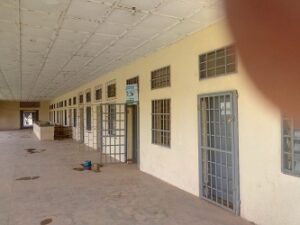
By Fatima Sanda Usara:
In order to ascertain level of readiness of Hajj departure centres, the Chairman and Chief executive Officer of NAHCON, Barrister Abdullahi Mukhtar Muhammad on Monday 8th July, 2019, visited the Kaduna Hajj transit Camp on Mando Road, Kaduna.
Going round the Camp, what the NAHCON Chairman and his team met was a camp ready to host intending pilgrims from across the state. Standing on the vast expanse of land housing the Hajj facility, one saw revenue generating potential waiting to be harnessed. Hopefully, by the time all bureaucratic technicalities are concluded, the Hajj transit facility will stand tall in hospitality to potential guests of The Most Merciful Lord.
Even as the state awaits full take-off of the Hajj Development Levy infrastructural program that will see hotels constructed across departure centres in the country, several amenities have been constructed in the camp for the ease of pilgrims while they await airlift to the holy land. When completed, the hotels will serve as pilgrims’ accommodation during Hajj seasons, and at off seasons, will be rented out to generate funds for the state boards and the Commission. The plan is to have clinics, event centres and mini markets in the vicinity of the camps for commercial and institutional uses.
For 2019 Hajj departure exercise, it is believed that water will not be the headache of Kaduna state pilgrims with two boreholes sunk in different locations of the camp. Indeed, the Commission’s Chairman had consistently maintained that providing pilgrims with essential facilities on camps is one of the strategies that must be used to ensure security by keeping at bay, criminals who would attempt to take advantage of the necessity to scheme their atrocities. For this reason, male and female toilets have been constructed around the guest waiting areas. Barbed wires adorn the perimeter fences where screened pilgrims are secluded and fortified before being transported to the airports.
The spaciously built male and female toilets raise only one concern, how pilgrims will deploy proper toilet etiquettes to help the state welfare board in maintaining its cleanness. Already, officials of the board are exploring different options to guarantee hygiene of the toilets and ablution cubicles at all times. The same goes for the newly constructed mosque which will benefit immensely from the pilgrims’ observance of good hygiene.
One remarkable arrangement in the Kaduna Hajj camp that may be unique to it, at least in this region of the country, is the compartment which houses Hajj Crescent Initiative, a non governmental organisation which has taken the responsibility of feeding pilgrims at the Hajj camp free of charge. It is an initiative that has been on going in the state for years and one that several pilgrims would wish is extended to their domains as well.
Usara writes from NAHCON